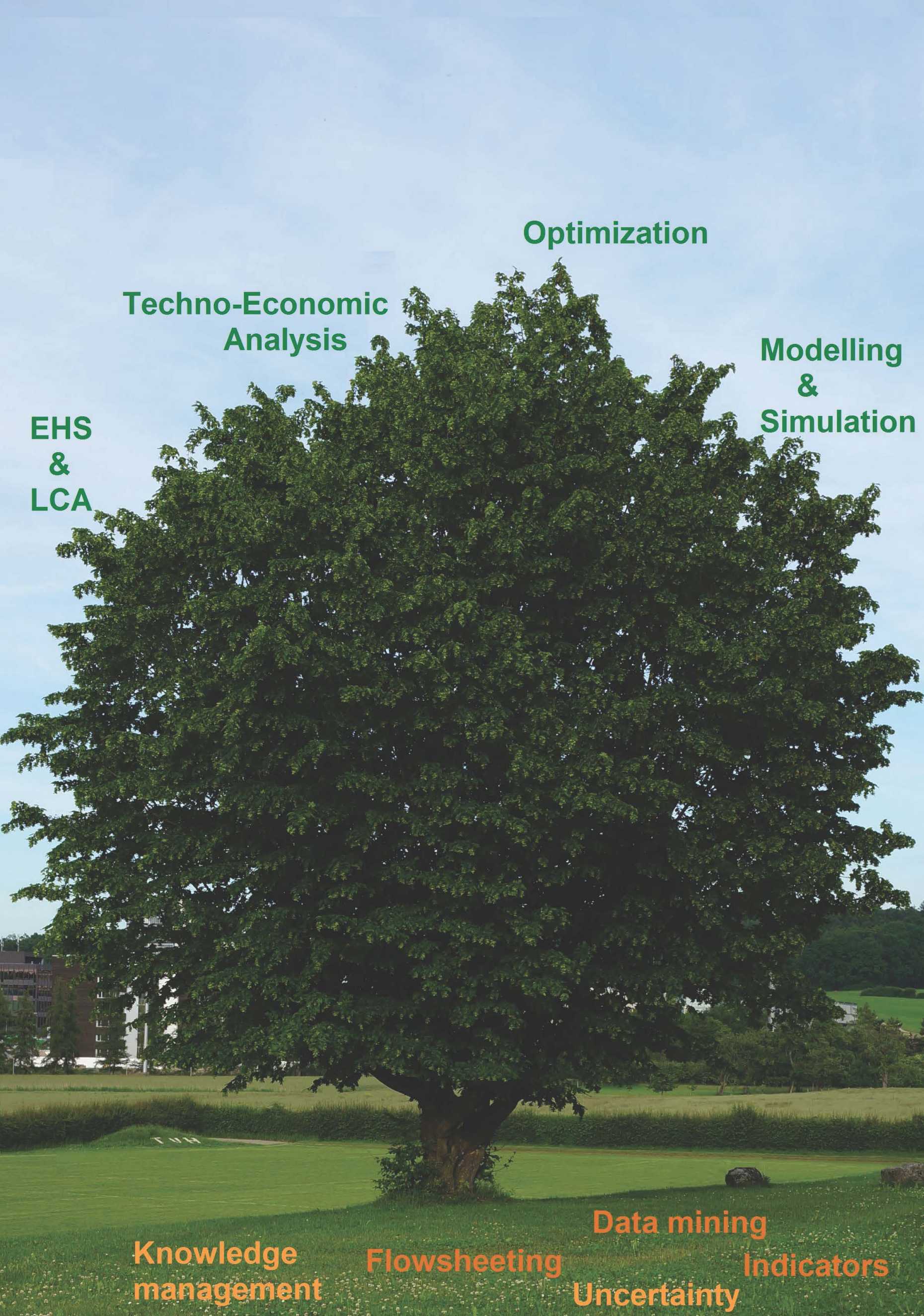Process Design and Optimization
Our group aims to optimize the design and operation of chemical processes considering resource management from a holistic and integrated conception of processes.
Chemical and process industries are highly complex systems involving multiple businesses, sites and process units whose scale ranges from the enterprise to the molecular level. Chemical processes consist of interlinked tasks which transform certain raw materials into both desired and waste products by consuming specific resources, such as energy, water or human labour (Figure 1).
Our research efforts aim to identify the optimal organization and exploitation of such resources according to sustainability principles and lead to an improved realization of processes. Much of our work highlights the reality that processes are normally not isolated entities from other processes and the environment. Their actual boundaries are usually diffuse and often merge, and multiple interactions and resource transfers occur among chemical processes and with their environment.
The life-cycle of chemical processes consists of different stages, including chemical research, process design, process implementation, plant operation, process monitoring, process retrofitting and re-design. During each stage, problems arise and decisions are made, thus influencing the process layout and operation.
The shift towards sustainability and increasingly stricter regulations has motivated the inclusion of environmental concerns in decision-making. Hence, the solutions for chemical processes design and operation should reflect the existing compromises among technical, economic, safety, and environmental issues.
Optimal decision-making requires the systematic use of data and information, as well as the development of adequate methods and tools. Hence, our group works on:

- the assessment based on available databases for physico-chemical properties of the substances involved in chemical processes;
- the generation of process models relying on the available data and information (e.g. data mining) at each decision stage;
- the application of elaborate commercial software tools and computer coding design based on programming environments for process simulation and flowsheeting;
- the formulation and use of indicators to capture the process "footprint";
- the selection and integration of optimisation algorithms to obtain the values decision variables of the process models driving towards the desired optimum; and,
- the creation of decision-support tools (e.g., sensitivity/uncertainty analysis; knowledge management) to assess the robustness of the solutions from a multi-objective perspective.
In close collaboration with chemical industry, our group strives to test and validate the developed methods and tools based on plant-level case studies.
Research activities within our group are mainly related to the following ten specific topics:
- Up-to-date databases for environmental, health and safety hazards as well as life cycle inventories.
- Development of deterministic and empirical (short-cut) process models, including advanced industrial-data fitting procedures. For this purpose we mainly use commercial software belonging to the CAPE-OPEN platform (e.g. ASPEN Plus, gPROMS, Matlab), which we extend with our in-house tools.
- Operation of batch processes, particularly in multiproduct/multipurpose batch plants, modeling of the most typical unit operations (e.g. reactors, distillation and absorption columns, crystallizers, filters).
- Stochastic and deterministic optimisation algorithms for design variables specification and empirical model development. These algorithms support multi-criteria decision making.
- Retrofitting of batch processes, focusing especially on indicator-based heuristic actions and their quantification with respect to financial and environmental targets.
- Planning and scheduling of chemical and pharmaceutical processes with respect to productivity, flexibility and environmental impact.
- Energy flow analysis in batch plants, estimation of avoidable and unavoidable losses, and systematic definition of the energy saving potential.
- Integrated chemical batch plant design with the extension of the typical process system boundaries to take into account energy conversion and waste management operations that serve the production processes.
- Green batch process chemistry promotion through the development of robust indicators for multi-criteria process assessment in early-phase process design.
- Development of in-house computer-aided tools suitable both for design and operation related decision making and plant performance monitoring, focusing on environmental issues (e.g. energy efficiency related).
Learn more about process modeling and optimization
If you have any question about our research or if you would like to join us for a research project (internship or Master Thesis) please contact Dr. Elisabet CapónGarcía directly.
